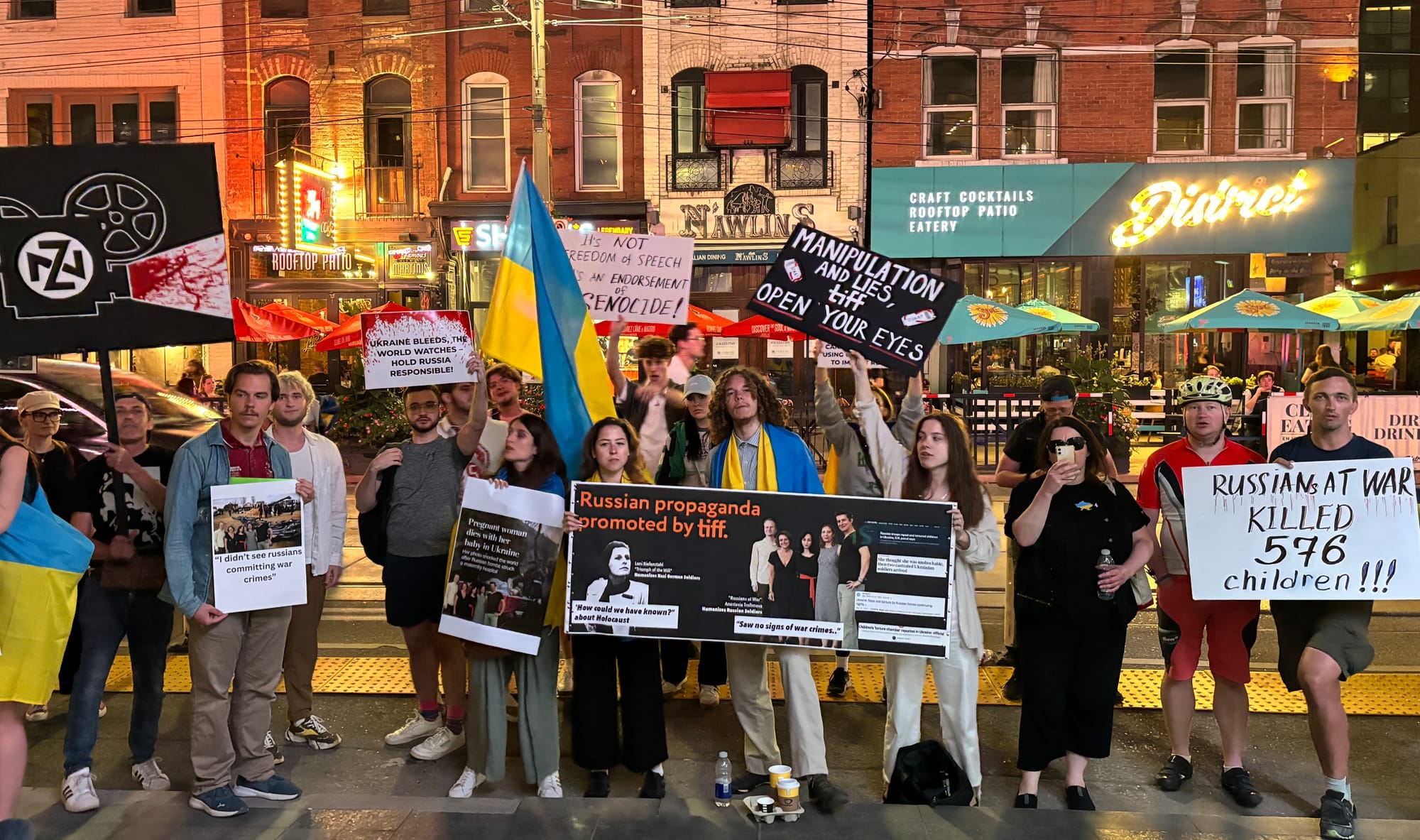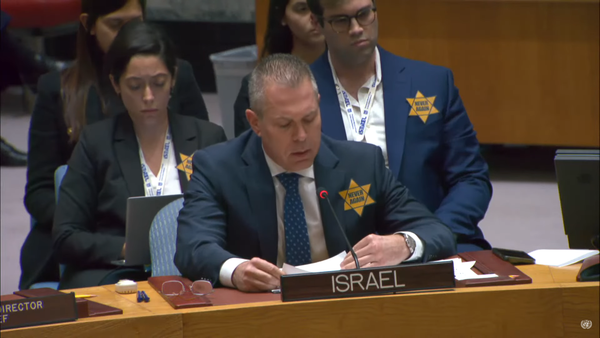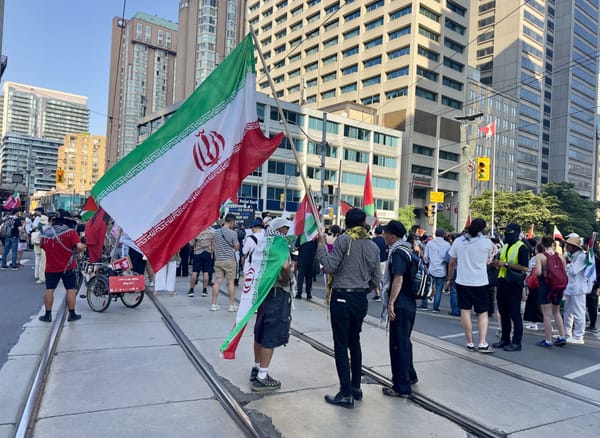I’ve watched more than 115 movies at the Toronto International Film Festival (TIFF) in the past few years, both at the annual festival and during its year-round operation. This week marked the first, and hopefully last, time I had to go through lines of police and security guards with metal detectors on my way into the cinema.
On Tuesday evening, I attended a screening of Russians At War, a documentary in which Russian Canadian director Anastasia Trofimova joins a Russian army unit and makes her way to the front line in Ukraine with them.
The documentary, which premiered on September 5 at the Venice International Film Festival, drew the ire of much of Canada’s Ukrainian community and its major organizations, who, alongside political allies, accused it of being Russian propaganda.
Russians At War, a France-Canada co-production, was set to be screened four times during TIFF’s 2024 festival, which ran from September 5 to 15. Only one of these screenings, a limited showing for press and industry members on September 10, actually happened. The other three were cancelled.
TIFF initially issued a statement on September 11 denouncing Russia’s invasion of Ukraine, defending the film on its merits and stating that it would premiere on September 13 as planned. The next day, however, TIFF updated its statement and claimed it had been forced to pause the planned screenings due to “significant threats to festival operations and public safety.” The statement said, “This is an unprecedented move for TIFF.”
A few days later, TIFF announced that it had rescheduled the screenings to this week. The screening I attended on September 17 was a strange hybrid between seeing a film at TIFF’s annual festival and its year-round location. I got the ticket at the year-round price, through the festival ticket platform, a couple days after the festival had officially ended, while being told it was actually the festival’s last screening.
The screening was preceded with remarks from the film’s producer, TIFF’s chief programming officer and TIFF CEO Cameron Bailey. Addressing why the festival screenings were cancelled, Bailey said, “In emails and phone calls, TIFF staff received hundreds of instances of verbal abuse. Our staff also received threats of violence, including threats of sexual assault. We were horrified, and our staff members were understandably frightened. We also learned of plans to stop or disrupt the screenings. Because last week’s screenings were scheduled at a 14-screen multiplex on some of the festival’s busiest days, we determined that it would be safer not to go ahead with those plans.”
“Today we can screen the film in a more secure environment,” Bailey added, as serious-looking security guards and police officers in the theatre, who remained there throughout the screening, watched on.
On my way out of the theatre after the Q&A, just like on my way in, I passed protesters carrying Ukrainian flags as well as signs denouncing the film. One of them in particular caught my eye. It read: “RUSSIANS AT WAR KILLED 576 CHILDREN!!!”
‘Holy shit,’ I thought, ‘did I really just watch a film about an army unit that killed that many kids?’ When I got home I searched up the number and found that it actually came from a January report stating Russia as a whole had killed that number of Ukrainian children since its invasion began in February 2022.
The death of even one child is a tragedy, and imagining any of the babies in my life being killed during a war is heartbreaking and enraging. Yet after finding the source of this number I couldn’t help but think about another film at TIFF that also drew protests, though with far less media coverage: Bliss, an Israeli production that enjoyed funding from the Israeli government.
I don’t think Russians At War was Russian propaganda. Yet if I saw a similar film about Israeli soldiers committing genocide in Gaza, I would likely have been disgusted. Trofimova explicitly stated that the documentary was intended to be an anti-war film. I’m not sure it necessarily was. If this were an Israeli or American film, I’d probably criticize it as an example of the “shoot and cry” genre, where the piece of art is created to absolve the consciences of the perpetrators. This doesn’t necessarily mean the film is propaganda or lacks any artistic merit, but it’s also not “anti-war” in a more useful way.
With that said, it’s also not fair to compare what Gazans and Ukrainians are going through. Though certainly the underdog in its war with Russia, Ukraine has a conventional army. Gaza does not. Ukraine has received hundreds of billions of dollars worth of arms, military training, aid and so much more from the most powerful governments in the world. Gaza has not. About 11,500 Ukrainian civilians have been killed in 2.5 years of war. At least 41,000 Gazans have been killed in under a year.
Israel is a more brutal actor than Russia, Gaza is in a worse spot than Ukraine and Ukrainians in Canada have enjoyed far more sympathy among those in power here than Palestinian Canadians. It’s just not the same. This is even true of how TIFF has handled Russian and Israeli films in the past couple of years.
A week after Russia’s invasion of Ukraine began, TIFF issued a statement condemning the action and stating, “TIFF will suspend participation by film organizations and media outlets supported by the Russian state, as well as Russian cultural ambassadors and delegations related to our Festival.” This sort of decision is in line with organized boycott and sanction campaigns that have been established in the past, and as far as I know TIFF has stood by their decision. (Russians At War apparently received its funding entirely from France and Canada, and therefore wasn’t impacted by this decision.)
Now what about Israel? On Oct. 12, 2023, TIFF tweeted: “We join with the international community in expressing horror at Saturday’s Hamas attacks in Israel and the loss of all innocent lives in the region. We condemn terrorist violence and discrimination in all its forms, and will continue to seek ways to illuminate paths to peace and understanding through the power of art.” And … that was it. Nothing since.
There’s no way for TIFF to justify its inaction on Israeli films after it already set a precedent by suspending the participation of many Russian ones. I believe this disparity exists because TIFF is often a cowardly institution, making decisions that while not necessarily wrong, are empty and challenge no one.
For example, TIFF has run land acknowledgements before all of its films for years. They regularly, and uncomfortably, draw applause from festival goers. But issuing a statement of solidarity with indigenous people in occupied Palestine currently being targeted in a genocide? Too much, apparently.
TIFF probably does care about Ukrainians, but it barred Russian films because it was a safe move to make. The entirety of Canada’s major institutions, political parties, corporations and others had already lined up against Russia at the time TIFF issued this statement. I doubt TIFF expected any blowback or financial losses, though Russian film historically has had a lot to offer.
Boycotting Israel, on the other hand? Totally different story. TIFF would get lumped in with the BDS movement and attacked by every political party out there, probably lose sponsors, donors and government funding, and much more. This point was reinforced to me on my way out of the screening when I remembered that the theatre I was in bears the names of the co-founders of an infamous charity for Israeli soldiers.
With all of this in mind, it’s a bit difficult to take the controversy over Russians At War very seriously. Ukrainians protesting the film are effectively complaining because they haven’t managed to achieve the complete suppression of anything even approaching a Russian perspective on the war. TIFF portrays itself as courageous for sort of pushing back.
Meanwhile, TIFF happily screens a film funded by a state committing genocide, and almost every party that complained about its ultimate decision on Trofimova’s film — including Deputy Prime Minister Chrystia Freeland, Liberal MP Yvan Baker, two Canadian senators, and many others — have nothing to say.
What will it take for anyone in power at Canada’s major institutions to take a principled stand for Palestine?







